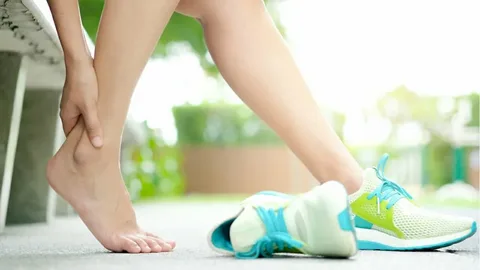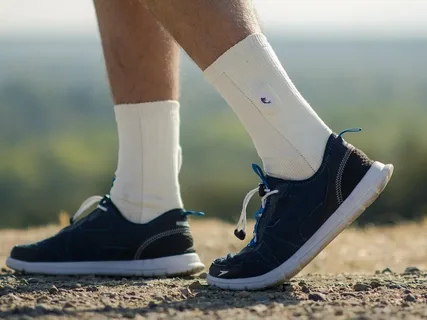Diabetes is a serious health condition that affects millions of people all over the world. While there is no cure for diabetes, one of the most important ways to manage it is by taking care of your feet. One of the best ways to do this is by wearing special shoes for diabetics. In this blog post, we’ll be discussing why these shoes are so important for diabetics and how they can help improve foot health. So if you or someone you know has diabetes, read on to find out more about the importance of special shoes.
What is Diabetes and How it Affects Feet
Diabetes is a chronic health condition characterized by high blood sugar levels. It occurs when the body either does not produce enough insulin or cannot effectively use the insulin it produces. Insulin is a hormone that helps regulate blood sugar levels and allows glucose to enter cells for energy.
So, how does diabetes affect the feet? Well, high blood sugar levels can damage the nerves and blood vessels in the feet, a condition known as diabetic neuropathy. This can lead to a loss of sensation, making it difficult to detect injuries or infections. Additionally, poor blood circulation due to diabetes can slow down the healing process and increase the risk of infection.
Diabetic feet are also prone to foot ulcers, which are open sores that can develop from minor cuts or injuries. These ulcers can become infected and, if left untreated, can even lead to amputation.
Understanding how diabetes affects the feet is crucial for managing the condition and preventing complications. That’s why it is vital for diabetics to take extra care of their feet, including wearing appropriate shoes. Special shoes designed for diabetics provide support, cushioning, and protection to minimize the risk of foot problems.
Problems Associated with Diabetic Feet
Living with diabetes can bring a range of complications, particularly when it comes to foot health. Diabetic feet face a myriad of problems that require careful attention and management. One of the most common issues is neuropathy, which causes a loss of sensation in the feet. This means that individuals may not feel any cuts, blisters, or injuries, making them more prone to infections and ulcers.
Moreover, diabetes can lead to poor circulation, further exacerbating the problem. When blood flow is compromised, the healing process slows down, and infections are more difficult to fight. Left untreated, foot ulcers can become severe and may even require amputation.
Benefits of Diabetic Golf Shoes
Golfing is a popular sport enjoyed by people of all ages and abilities. However, for individuals with diabetes, it’s important to take extra precautions to protect their feet. That’s where diabetic-golf shoes come in. These specialized shoes offer numerous benefits that can enhance foot health and overall comfort while on the golf course.
First and foremost, diabetic golf shoes are designed with extra depth and width to accommodate any foot deformities or swelling that may be associated with diabetes. This means that they provide a more comfortable fit, reducing the risk of blisters, calluses, and pressure points. The added depth also allows for the insertion of custom orthotics, providing additional support and stability for those with specific foot conditions.
In addition to the generous fit, diabetic-golf shoes are also constructed with soft, breathable materials that promote air circulation and reduce moisture buildup. This is particularly important for individuals with diabetes, as excessive moisture can lead to fungal infections and other foot problems. By keeping the feet cool and dry, diabetic golf shoes help prevent the development of these issues.
Another key feature of diabetic-golf shoes is their enhanced shock absorption and cushioning. The soles are often made of materials that offer excellent shock absorption, which is especially beneficial for individuals with diabetic neuropathy. This condition can result in a loss of sensation in the feet, making it essential to have proper cushioning to protect against injuries caused by repetitive impact.
Furthermore, diabetic-golf shoes are often constructed with non-slip outsoles, providing excellent traction on the golf course. This can help prevent slips and falls, reducing the risk of foot and ankle injuries.
 What Makes Shoes Suitable for Diabetic Feet?
What Makes Shoes Suitable for Diabetic Feet?
When it comes to selecting shoes for individuals with diabetic feet, there are a few key features to consider. The primary goal is to choose shoes that prioritize comfort, support, and protection. Here are some factors that make shoes suitable for diabetic feet:
- Proper Fit: Shoes should have ample depth and width to accommodate any foot deformities or swelling. A snug fit can cause pressure points, blisters, and other complications. Look for shoes that provide enough room for the toes to move freely without rubbing against the sides.
- Cushioning and Shock Absorption: Diabetic feet require additional cushioning to protect against injuries caused by repetitive impact. Look for shoes with well-cushioned insoles and shock-absorbing soles. This helps minimize the risk of foot ulcers and injuries, especially for those with reduced sensation in their feet.
- Breathable Materials: Shoes made from breathable materials such as mesh or leather allow air circulation and reduce moisture buildup. Excessive moisture can lead to fungal infections and other foot problems, so it’s essential to choose shoes that keep the feet cool and dry.
- Adjustable Closures: Shoes with adjustable closures, such as Velcro straps or laces, allow for a customizable fit. This is particularly beneficial for individuals with foot swelling or deformities, as it ensures a secure and comfortable fit.
- Non-Slip Soles: Look for shoes with non-slip outsoles to provide excellent traction and stability. This helps prevent slips, trips, and falls, reducing the risk of foot and ankle injuries.
Types of Diabetic House Shoes
When it comes to diabetic foot health, it’s not just about wearing the right shoes outdoors; having the right footwear indoors is just as important. Diabetic house shoes are designed to provide comfort, support, and protection while you’re at home. Here are a few types of diabetic-house shoes to consider:
Slippers with adjustable closures
These slippers are perfect for those with foot swelling or deformities. They typically have adjustable closures such as Velcro straps or elastic bands, allowing for a customizable fit. This ensures that your feet are secure and comfortable while you move around your home.
Orthopedic slippers
These slippers are designed to provide extra support and cushioning for your feet. They often have a contoured footbed and arch support to alleviate pressure on the feet. Orthopedic slippers are a great choice if you have foot conditions such as plantar fasciitis or flat feet.
Diabetic socks with non-slip soles
If you prefer to go without shoes indoors, diabetic socks with non-slip soles are a great option. These socks have rubber grips on the soles, providing traction and stability while reducing the risk of slips and falls. They also offer cushioning and moisture-wicking properties to keep your feet comfortable and dry.
Foot braces
For individuals with foot deformities or conditions such as drop foot, foot braces can provide the necessary support and stability. These braces are designed to hold the foot in the correct position and help improve walking and balance.
Tips for Choosing the Right Shoes
When it comes to choosing the right shoes for diabetics, there are a few important tips to keep in mind. First and foremost, proper fit is crucial. Look for shoes that have ample depth and width to accommodate any foot deformities or swelling. A snug fit can lead to pressure points and blisters, so make sure there is enough room for your toes to move freely without rubbing against the sides.
Cushioning and shock absorption are also key factors to consider. Diabetic feet require extra protection against injuries caused by repetitive impact, so opt for shoes with well-cushioned insoles and shock-absorbing soles. This will help minimize the risk of foot ulcers and injuries, especially for those with reduced sensation in their feet.
Breathable materials are important for keeping your feet cool and dry. Look for shoes made from materials such as mesh or leather, as they promote air circulation and reduce moisture buildup. Excessive moisture can lead to fungal infections and other foot problems, so it’s crucial to choose shoes that prioritize breathability.
Adjustable closures, such as Velcro straps or laces, are beneficial for individuals with foot swelling or deformities. They allow for a customizable fit, ensuring that your feet are secure and comfortable.
Lastly, non-slip soles are essential for providing excellent traction and stability. This will help prevent slips, trips, and falls, reducing the risk of foot and ankle injuries.
FAQs
Q: Do I really need special shoes if I have diabetes?
A: Yes, special shoes designed for diabetics are highly recommended. Diabetes can cause nerve damage and poor circulation in the feet, increasing the risk of foot problems. Special shoes provide the support, cushioning, and protection needed to minimize this risk and promote foot health.
Q: Where can I find diabetic shoes?
A: Diabetic shoes can be found at specialized footwear stores, online retailers, or through medical supply companies. It’s important to consult with a healthcare professional or specialist who can guide you in finding the right shoes for your specific needs.
Q: Can I use regular shoes if I have diabetes?
A: While regular shoes may be suitable for some individuals with diabetes, it is highly recommended to invest in diabetic shoes. Regular shoes often lack the necessary features to protect against foot problems, such as proper cushioning and support. Diabetic shoes are designed specifically to address the unique needs of diabetic feet.
Conclusion
In this blog post, we have explored the importance of special shoes for people with diabetes and how they can significantly improve foot health. Diabetes is a serious health condition that can have detrimental effects on the feet, including neuropathy, poor circulation, and foot ulcers. These problems can lead to severe complications and even amputation if not properly managed.
| Other Good Articles to Read |
| Niche Blogs Connect |
| Blogs 97 |
| Blog Stitution |
| Blogs Unplugged |
| Blogs Cotch Rouge |
| Blog Signatr |
| Blog Sintonias |
| Blog Zilla |
| Consumer Forums |
| Finance Forums |
| G Blogs |
| Too Blog |



